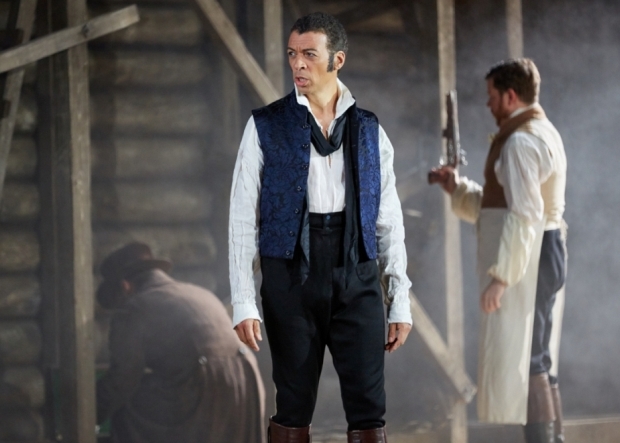Eugene Onegin (Garsington Opera at Wormsley)

© Mark Douet
If it’s chandeliers you’re after, look elsewhere. Garsington Opera's new Eugene Onegin keeps things simple, the Larinas’ wooden dacha nothing more than interlocking stage elements that later become a semi-abstract mirrored ballroom. Director Michael Boyd‘s focus is entirely on the characters, both young and not so young.
Eugene Onegin depicts the folly of an arrogant young man, the death of his impetuous friend Lensky and the blossoming of an infatuated teenager, Tatyana. It is a tragedy in all but name, since sometimes the burden of life can be crueller than the alternative.
Boyd establishes Tatyana’s character during the prelude by showing Pushkin’s dreamy proto-Bovary in thrall to some literary romance. When, at a descending orchestral figure, she and her book slide luxuriantly to the floor, we know we’re in safe hands. The director has worked closely on detail with his namesake, the conductor Douglas Boyd, and his staging is peppered with such telling moments, as when Tatyana’s sister Olga mimics a song the peasants have just been singing. They briefly gaze in her direction, a hint of languid contempt on their faces, then turn away. They have no interest in her privileged world.
But we do. Onegin is an opera about the passage of time and how we change. The touching directness of youthful courtship gives way to an acutely-observed tapestry of the heart; it’s an opera that starts simply but ends in a fury of elaborate cross-stitch. Boyd gets this progression exactly right as he depicts Tatyana’s struggle to build a carapace around her emotions. The result, though theatrically flawed in places, is shattering.
'An astonishing capacity for stillness'
Designer Tom Piper and his lighting colleague, Giuseppe di Iorio, make deft use of Garsington’s evening sunshine to bathe the opening scene in Madame Larina’s garden in natural light, while the decision to stage the first-act ball within cramped confines not only means the later, grander affair has maximum impact but also ensures we miss none of the reactions to Onegin’s impulsive behaviour.
The duel scene crackles with the tension of a Sergio Leone stand-off, but the director’s decision thereafter to show Lensky as a ghost who haunts Onegin is only partially realised. The dead, bloodied body jumps to its feet in a way that takes us out of the moment, and the spectral idea is never happily integrated thereafter.
With superb conducting and committed orchestral playing, though, Tchaikovsky is well served. The singing is heartbreaking, from Brindley Sherratt‘s exquisite rendition of Prince Gremin’s aria to Roderick Williams‘s tonally gorgeous but psychologically screwed-up Onegin, a man he plays as beset by emotions but hostage to the mores of his time.
Tenor Oleksiy Palchykov as the impetuous Lensky sings with limpid clarity but a slight tendency to over-husband his resources, and Jurgita Adamonyté is a suitably brittle Olga.
We ache for aged nursemaid Filippyevna’s arthritic joints as the excellent Kathleen Wilkinson lugs heavy chairs from room to room; Mark Wilde‘s gentle Monsieur Triquet, the life and soul of a doomed party, is sincere rather than creepy. There’s balletic movement work by Liz Ranken that’s curiously unidiomatic but of a piece with the production’s symbolic lurches, and a resonant Garsington Chorus.
There’s no mistaking the star turn, however. Natalya Romaniw is a sublime Tatyana, blest with a full-toned soprano that's clean of detritus but laden with subtext. Her delivery of the celebrated letter scene, all 17 minutes of it, is effortless; moreover, she hides her anguish beneath a mesmerising capacity for stillness. With Romaniw, moments when nothing happens are the ones where the most is going on.
Eugene Onegin runs in repertory at Garsington Opera until 7 July.










